6 Best Cat Foods For Hyperthyroidism
This page contains affiliate links. We may earn money or products from the companies mentioned in this post through our independently chosen links, which earn us a commission.
Hyperthyroidism, or having an overactive thyroid gland, is relatively common in cats, especially as they get older. Since thyroid hormones affect nearly all of the organs in the body, this disease often causes secondary problems such as heart disease and high blood pressure.
There are several treatment options for cats with hyperthyroidism including medication and dietary therapy. If your cat is diagnosed, we can help you choose the best cat foods for hyperthyroidism.
Compare Best Cat Foods For Hyperthyroidism
|
Runner Up
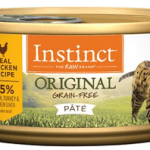
2. Instinct Original Grain-Free Pate Real Chicken Recipe Wet Canned Cat Food |
Premium Choice
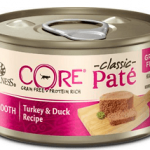
3. Wellness CORE Natural Grain Free Turkey & Duck Pate Canned Cat Food |
Best For Kittens
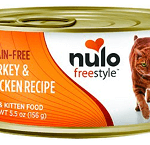
4. Nulo Freestyle Turkey & Chicken Recipe Grain-Free Canned Cat & Kitten Food |
Best Budget
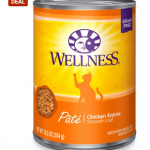
5. Wellness Complete Health Pate Chicken Entree Grain-Free Canned Cat Food |
Best For kidney Disease
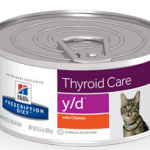
6. Hill's Prescription Diet y/d Thyroid Care with Chicken Canned Cat Food |
|
|
Protein
8% Min |
Protein
10% Min |
Protein
12% Min |
Protein
11% Min |
Protein
10.5% Min |
Protein
8% Min |
|
Fat
6% Min |
Fat
7.5% Min |
Fat
8% Min |
Fat
6.5% Min |
Fat
7% Min |
Fat
6% Min |
|
Fiber
2% Max |
Fiber
3% Max |
Fiber
1% Max |
Fiber
0.75% Max |
Fiber
1% Max |
Fiber
1.5% Max |
|
Moisture
82% Max |
Moisture
78% Max |
Moisture
78% Max |
Moisture
78% Max |
Moisture
78% Max |
Moisture
78% Max |
|
Caloric Content
1190 kcal/kg or 185 kcal/156 g carton |
Caloric Content
193 kcal/5.5 oz can |
Caloric Content
215 kcal/5.5-oz can |
Caloric Content
193 kcal/can |
Caloric Content
186 kcal/5.5 oz can |
Caloric Content
188 kcal/5.5 oz can |
|
Food Type
Fresh |
Food Type
|
Food Type
|
Food Type
|
Food Type
|
Food Type
|
What Kind Of Diet Should You Feed A Cat With Hyperthyroidism?
The best cat foods for hyperthyroidism includes a new prescription diet made especially for cats with hyperthyroidism: Hill’s Prescription Diet y/d Feline. This is not a medicated food but it does have 10 years of clinical nutrition research to support it.
This food helps hyperthyroid cats by strictly controlling dietary levels of iodine so the cat’s body can resume normal thyroid hormone production.
The iodine content in the food is precisely limited to 0.32 parts per million. (You cannot omit iodine from your cat’s diet completely.) For this diet to work, it must be the only food fed to your cat.
The down side to the Hill’s diet for hyperthyroid cats is that it might not be appropriate if your cat has other medical issues such as diabetes mellitus or kidney disease.
If your cat needs to change diets at some time in the future, the hyperthyroidism will return. Limiting iodine in your cat’s diet cuts off the excess production of the thyroid hormones but it does not cure the disease.
There are other ways to treat hyperthyroidism in cats that might be a better option for you and your cat such as daily medication, surgical removal of the thyroid glands, or radioactive iodine therapy. Both surgical removal of the thyroid glands and radioactive iodine therapy can cure hyperthyroidism in cats in many cases.
Other sources suggest that you should feed hyperthyroid cats, which tend to be older, a diet that is high in easily-digestible protein (even higher than usual for most cats); and low in carbohydrates. You can look for a food that has 50-70 percent protein, 5-10 percent carbohydrates, and 30-40 percent fat.
This kind of diet should provide protein to counter muscle wasting that comes from hyperthyroidism. It is also high in calories to offset your cat’s higher metabolic rate. And, it can be adjusted if your cat has other health issues.
What To Look For When Choosing A Food For A Cat With Hyperthyroidism?
When you are choosing the best cat foods for hyperthyroidism, we recommend that you look for the following:
- Choose a canned/wet food. These foods contain more moisture which all cats need. They are also lower in carbohydrates than dry foods which is better for cats.
- Consider whether your cat would do well on a prescription diet such as Hills Prescription Diet y/d Feline. This food is a good choice for some, but not all cats with hyperthyroidism.
- If your cat has no other health problems, look for a food that is high in protein, with low carbohydrates, and 30-40 percent fat. If your cat has additional health problems, please talk to your veterinarian about the best cat foods for hyperthyroidism with associated health issues.
- Ideally, you can find good cat foods from companies that have solid feline nutritional research to back up their formulas. They should also have veterinary nutritionists on staff to formulate their foods; and maintain good quality control.
According to some web sites and feline nutritionists, you should avoid feeding your cat any foods that contain soy and other ingredients that are known to interfere with the endocrine system. This applies not just to hyperthyroid cats but to all cats. Some nutritionists also recommend that you should not feed your cat too much fish-based cat food because of possible toxins the fish can absorb that might affect your cat.
Best Canned and Dry Foods For Cats With Hyperthyroidism Reviewed
Open Farm Homestead Turkey Rustic Blend Wet Food
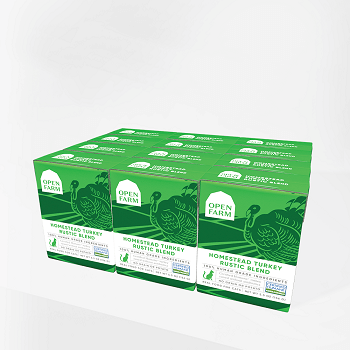
Product Info
- Protein: 8% Min
- Fat: 6% Min
- Fiber: 2% Max
- Moisture: 82% Max
- Caloric Content: 1190 kcal/kg or 185 kcal/156 g carton
- Food Type: Fresh
- Made from highly-digestible protein
- Made from human-grade ingredients
- Staffed by nutrition experts
- Free of ingredients that could trigger hyperthyroidism
- Low in carbohydrates
- Fairly expensive compared to the average cat food
- Contains several plant-based ingredients
Open Farm Homestead Turkey Rustic Blend Wet Food offers the caloric density, ultra-digestible protein content, and nutritional gusto that hyperthyroid cats need without anything that could worsen their condition.
At about 33 calories per ounce, this food is more calorie-dense than other wet products. It’s also rich in protein from highly-digestible sources, including chicken breast, thigh, and liver. Though the food contains some fruits and vegetables, it keeps carbohydrate content at around 10% on a dry matter basis, making it appropriate for insulin-resistant cats.
Open Farm offers a distinctive cat food experience. The company creates small batches of human-grade food, packages it in pre-portioned bags, and ships it to your door according to a custom delivery schedule.
If you’re not sure if Open Farm is a good choice for your cat, the company invites you to send them your cat’s latest bloodwork and medical information. The Open Farm expert staff can review your cat’s medical history to make a personalized recommendation.
Instinct Original Grain-Free Pate Real Chicken Recipe Wet Canned Cat Food
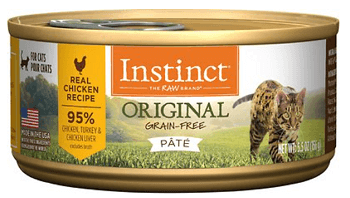
Product Info
- Protein: 10% Min
- Fat: 7.5% Min
- Fiber: 3% Max
- Moisture: 78% Max
- Caloric Content: 193 kcal/5.5 oz can
- High in protein and fat which have been recommended for cats with hyperthyroidism
- Made with 95 percent chicken, turkey, and liver
- This food contains no grain, potatoes, corn, wheat, soy, by-product meal, artificial colors, or preservatives
- This food is not specifically made for cats with hyperthyroidism
This recipe is made with 95 percent chicken, turkey, and liver to provide your cat with plenty of protein. It contains 5 percent vegetables, fruits, vitamins, and minerals.
This formula contains no grain, potatoes, corn, wheat, soy, by-product meal, artificial colors, or preservatives.
Wellness CORE Natural Grain Free Turkey & Duck Pate Canned Cat Food
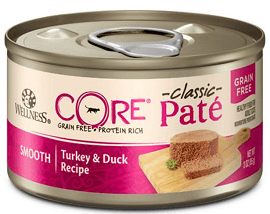
Product Info
- Protein: 12% Min
- Fat: 8% Min
- Fiber: 1% Max
- Moisture: 78% Max
- Caloric Content: 215 kcal/5.5-oz can
- High in protein and fat which have been recommended for cats that are hyperthyroid
- This formula contains no grains, carrageenan, artificial preservatives, colors or flavors
- Contains highly digestible nutrients
- Not all Wellness CORE recipes have fat percentages that would be high enough for cats with hyperthyroidism so you should read the percentages carefully
- This formula is not specifically made for cats with hyperthyroidism
These are some of the highest crude figures we have found in any canned foods. This is a grain free recipe with lots of protein and fat to support a hyperthyroid cat that is having problems with muscle wasting and weight loss.
Omega fatty acids can also help with coat problems that usually accompany hyperthyroidism in cats. This formula contains no carrageenan, artificial preservatives colors, or flavors.
Nulo Freestyle Turkey & Chicken Recipe Grain-Free Canned Cat & Kitten Food
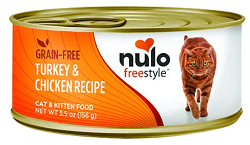
Product Info
- Protein: 11% Min
- Fat: 6.5% Min
- Fiber: 0.75% Max
- Moisture: 78% Max
- Caloric Content: 193 kcal/can
- High in protein and fat that is sometimes recommended for cats with hyperthyroidism
- Contains no grains, corn, wheat, artificial preservatives, colors, flavors, carrageenan, or meat by-products
- Premium proteins provide good nutrition
- Nulo foods are not specifically made for cats with hyperthyroidism
- Check the percentages for Nulo recipes since some have more fat than others
This formula contains no grains, corn, wheat, and no artificial preservatives, colors, or flavors. It also has no carrageenan or meat by-products.
Wellness Complete Health Pate Chicken Entree Grain-Free Canned Cat Food
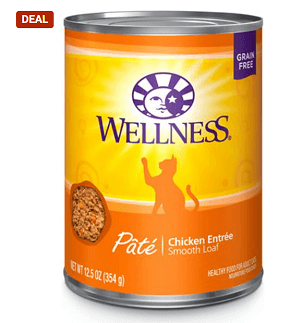
Product Info
- Protein: 10.5% Min
- Fat: 7% Min
- Fiber: 1% Max
- Moisture: 78% Max
- Caloric Content: 186 kcal/5.5 oz can
- High in protein and fat which are often recommended for cats with hyperthyroidism
- This formula contains no grains, carrageenan, artificial preservatives, coloring, or flavoring
- Contains real chicken as the #1 ingredient
- Wellness Complete Health is not specifically formulated for cats with hyperthyroidism
- Check the nutrient percentages for other Wellness Complete Health foods since some of them have lower fat percentages
Antioxidants, vitamins, minerals, omega fatty acids, and taurine support your cat’s immunity and overall good health. This formula contains no carrageenan, no artificial preservatives, and no coloring or flavors.
Hill's Prescription Diet y/d Thyroid Care with Chicken Canned Cat Food
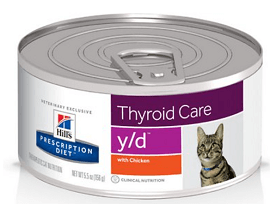
Product Info
- Protein: 8% Min
- Fat: 6% Min
- Fiber: 1.5% Max
- Moisture: 78% Max
- Caloric Content: 188 kcal/5.5 oz can
- 10 years of clinical research supports the formula
- Supports kidney health with controlled phosphorus and sodium leavels
- Very palatable
- This is the only food your cat can eat with this diet
- Hyperthyroidism will return if you discontinue the diet
According to Hill’s, it is clinically proven to restore thyroid health in three weeks.
As discussed above, this food has to be fed as the only source of nutrition for your cat. It is the only cat food made today that is specifically for cats with hyperthyroidism.
Hyperthyroidism In Cats
When hyperthyroidism (also called thyrotoxicosis) occurs, there is an overproduction of the thyroid hormones known as T3 and T4. The thyroid gland, located in the cat’s neck, is enlarged at this time. This is usually due to a non-cancerous tumor known as an adenoma. Rarely, hyperthyroidism is due to a malignant tumor called a thyroid adenocarcinoma.
There are two thyroid glands in the cat’s neck. One or both of them can be enlarged and producing too much thyroid hormone. It’s more common for both glands to be enlarged.
Since thyroid hormones affect most organs in the body, the symptoms of thyroid disease can be varied.
The average age of cats diagnosed with hyperthyroidism is 13 years old. Hyperthyroidism occurs in cats younger than 10 years of age only about 5 percent of the time.
What Causes Of Hyperthyroidism In Cats
The exact cause of feline hyperthyroidism is not known. High levels of dietary iodine are a suspected cause but this is only a theory.
Environmental factors may also affect cats but this has also not been proven. Siamese cats appear to have a slight elevated risk for hyperthyroidism but the disease occurs in all breeds and mixes.
Symptoms Of Hyperthyroidism In Cats
Signs of hyperthyroidism can include:
- A poor coat
- Aggressive or “cranky” behavior
- Increased activity and restlessness
- Increased amount of stool or diarrhea
- Increased appetite
- Increased urination
- Increased water drinking
- Occasional depression
- Occasional difficulty breathing
- Occasional vomiting
- Occasional weakness
- Rapid heart rate
- Weight loss
Weight loss, despite an increased appetite, is a classic symptom of hyperthyroidism in cats.
How Often Should You Feed a Cat With Hyperthyroidism
With hyperthyroidism the cat has an increased metabolism but they can’t consume enough calories to keep up with the energy their body is using. Each cat has her own nutritional needs based on previous medical conditions and general health, you should consult your veterinarian on how much to feed her and often.
Conclusion
Feline hyperthyroidism has become quite common today. Many cats are living past 10 years of age when they are most likely to develop this disease. Fortunately, there are several treatments and even cures for hyperthyroidism.
The disease can be managed by diet for many cats. We recommend that you talk to your veterinarian about the different ways of treating hyperthyroidism in cats to see which one would be most appropriate for you and your cat.

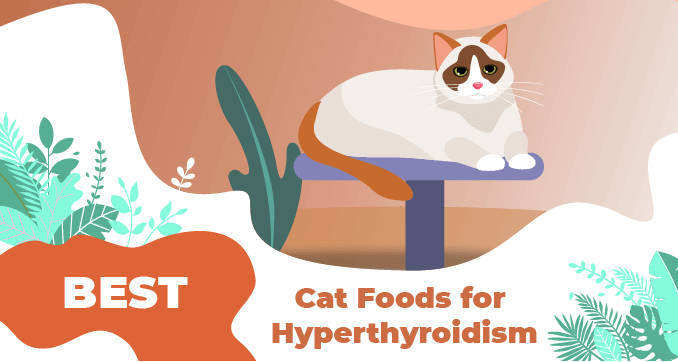
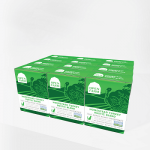
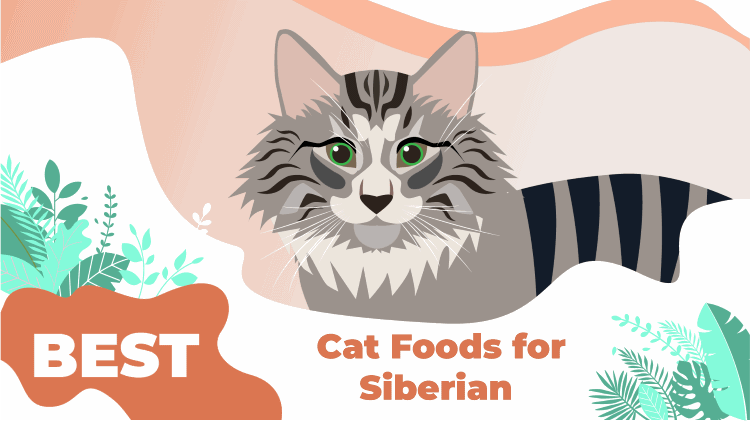
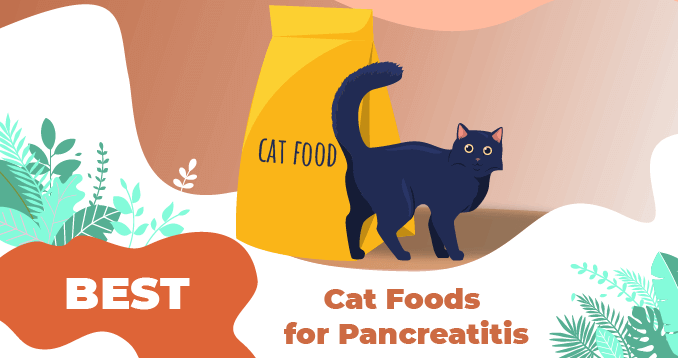
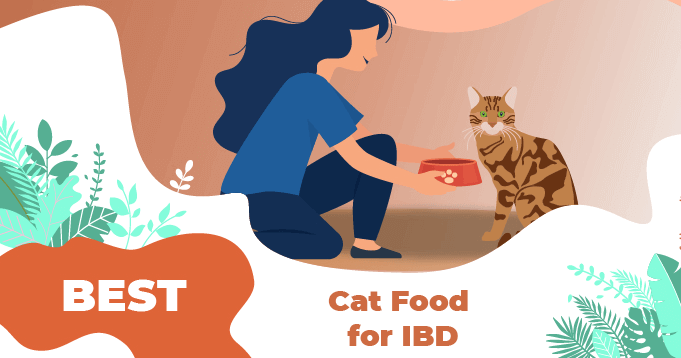
Carolyn Aydt
Can i feed my cat with hyperthyroid disease hills chicken urinary cd diet since it has very low iodine content?
Lisa S
You barely mention iodine, which most sources list as a critical ingredient to minimize in a cat's diet. Is there a reason why you barely mention it?